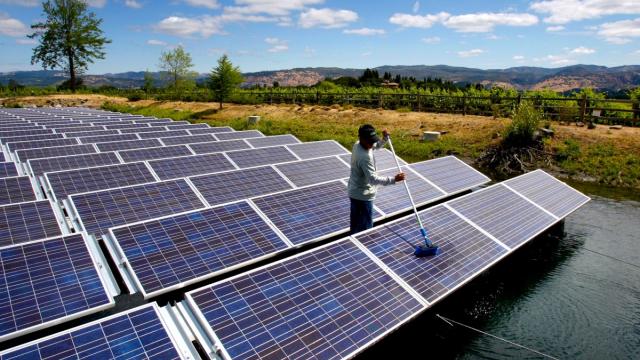
Elbin Blatz washes off one of 994 panels in the floating solar cell array at Far Niente winery in Oakville, California. The array produces all the electricity the winery needs. Photograph: Brant Ward/Corbis
Sewage and solar power may be odd bedfellows in the race to save the climate. But in Sonoma County, one hour north of San Francisco, an experiment is underway to install the nation’s largest floating solar array on a series of wastewater treatment ponds.
The sprawling 12.5MW Megawatt “flotovoltaic” park due for completion in 2016 covers 38 acres, or the area of 35 football fields, in a farming and vineyard region where real estate costs are at a premium.
The project signals the growing clout of Sonoma Clean Power, a new government-run agency that has made this county of 500,000 the lead producer of solar energy per capita in America. At 310 watts of installed power per person, Sonoma has five times the national average.
Since launching last May, the program says it has saved 100,000 metric tonnes in emissions – the equivalent of taking 21,000 vehicles off the road – while lowering consumers’ energy bills 6-9%.
Now, this publicly-run model to finance and produce clean energy is leading a nationwide movement as communities look to speed the US transition toward renewable power, with similar programs flourishing from Massachusetts and Rhode Island to New Jersey, Ohio and Illinois.
Known as Community Choice Aggregation, or CCA, programs like Sonoma’s are bringing competition into power generation by letting cities and counties decide where their energy comes from.
Geof Syphers, CEO of Sonoma Clean Power, likens the market-driven model to an energy “bank,” because “it’s a way of taking on debt in the form of power contracts, and producing income in the form of energy bills.”
He added: “[CCAs are] taking a huge amount of revenues that used to leave the county, bringing them back under local control, and buying cleaner power.”
The model functions by agencies signing contracts to buy power from private companies generating solar, wind, hydro, geothermal, biogas and other clean sources of energy; that’s the “debt.” The traditional investor-owned utilities, which still control and maintain the power grid, distribute that clean energy to customers whose electricity bills shift to paying the agencies instead of them – providing governments with the “income” they need to pay off the energy contract debts and invest in further clean power.
Ratepayers have a choice of whether to receive cleaner electricity at reduced cost through agency management, or to opt out and continue using conventional fossil fuel-based power produced by large utilities.
In Sonoma, the market has spoken in favor of clean energy. Here, solar arrays mounted on more than 7,000 residences and businesses dot the landscape. Other recent large-scale projects contracted through Sonoma Clean Power include a 70MW solar plant in Lemoore, California, and a 50MW deal bringing geothermal power from nearby geysers – a combined electricity output to power 70,000 homes.
Two new CCA programs go online this summer: Lancaster Choice Energy in southern California, and Sustainable Westchester in Westchester County, serving 360,000 people in more than two dozen towns and cities outside New York City.
Delaware is now looking to implement the community choice model, and even Utah – a Western state heavily reliant on coal and gas production – seeks to use CCAs to provide urban areas like Salt Lake City and Park City with clean power. Currently, Cincinnati is the largest US city with green energy aggregation, after Chicago last month announced its return to its traditional electricity supplier because the city’s renewables program failed to deliver competitive enough prices.
There is another problem in the Midwest, where clean energy programs have at times failed to reduce emissions. In Illinois, for example, more than 650 communities switched their power source through contracts with alternative retail energy suppliers (ARES). But many of those suppliers offer only voluntary clean power options and buy Renewable Energy Certificates (RECs), which “green up” their energy supply without adding emissions-free power to the mix.michael kors bags outlet
“They haven’t actually purchased the clean power – what they’ve purchased is the certificates that allow them to say it’s clean, and instead purchased power through fossil fuels,” said Shawn Marshall, co-founder and director of LEAN Energy US, which tracks community choice programs nationwide. “We’re saying, do more: leverage your buying power to radically shift to clean energy.”michael kors bags outlet
In California, that radical shift is happening. Marin Clean Energy (MCE) supplies renewable power to 165,000 customers across four northern California counties, and shaved $6m off consumers’ bills last year. More than 20 cities and counties statewide are pushing to establish CCA programmes – from Napa, Alameda and Santa Clara counties in the Bay Area, to Santa Barbara, Los Angeles and San Diego in the south. San Francisco will launch a CCA later this year.
Under governor Jerry Brown’s new ambitious climate goals, the state aims to produce 50% of its power from renewables, cut vehicle fuel use in half, and double the energy efficiency in buildings by 2030.
“People here are trying to think really big and change the world. We have to try things, even if we fail,” said Syphers.
3 WAYS TO SHOW YOUR SUPPORT
- Log in to post comments











